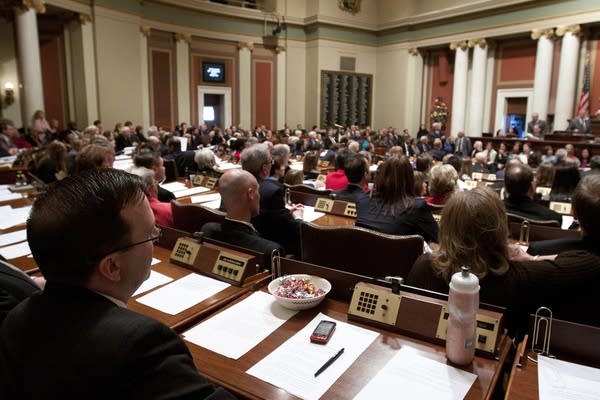Analysis of numbers hard to see in GOP budget cuts

Republicans in the Minnesota House are moving forward with a budget plan that they say erases the state's $5 billion projected deficit through spending reductions.
Committee chairmen have been releasing specifics of the plan this week, and they say their plans are to dramatically reform how state government does business. But some of their proposals are sketchy on details, and Democrats say the savings may not add up.
State Rep. Morrie Lanning, R-Moorhead, said his State Government Finance bill includes hundreds of millions of dollars in cuts to state agencies, state employee workforce reductions and a freeze on employee compensation. Lanning said his proposal is aggressive in changing how state government operates.
"The bill also has as much reform in the way we operate government as I've seen in any bill before," he said.
Create a More Connected Minnesota
MPR News is your trusted resource for the news you need. With your support, MPR News brings accessible, courageous journalism and authentic conversation to everyone - free of paywalls and barriers. Your gift makes a difference.
Reform is a theme at the Capitol this year. The bill uses catchy buzzwords like zero-based budgeting, sunsetting state mandates and increasing tax analytics. But the savings behind those buzzwords aren't guaranteed.
State Rep. Phyllis Kahn, DFL-Minneapolis, marveled at how Republicans say the bill will save money.
"It's based on money that's just kind of pulled out of thin air" she said.
"It's a convenient gimmick to obscure the real consequences of some of these proposed cuts on real people's lives."
Kahn said the savings promised in the bill aren't based on fact. For example, she said, the state government budget bill books $133 million in savings from increased tax compliance. But nonpartisan researchers can say only that there will be savings; they can't say how much.
Lanning, the bill's author, said he based his numbers on what other states are doing. During a committee hearing, he tried to deflect criticism that he's moving forward with a budget bill that isn't based on solid numbers.
"We're proposing things here that Minnesota has never done before, and that isn't coming together in a fiscal note readily like we would hope," Lanning said.
The problem with crafting a budget that isn't based on nonpartisan research means lawmakers may think they're passing a balanced budget when they're not. That means the governor and Legislature would be forced to continuously revise the budget to make it add up.
Another budget bill that may not be based on solid research is the House Jobs and Economic Development bill, which would tap $60 million in economic development funds for the Iron Range. That money is paid by Iron Range mining companies in lieu of property taxes.
Even the bill's author, state Rep. Bob Gunther, R-Fairmont, doesn't think the move is legal.
"What we're taking is their economic development fund, and using that for other purposes for other places," Gunther said. "If it went to court, we probably wouldn't prevail anyway."
The House Health and Human Services Finance bill also counts on savings that may be unrealistic.
For example, the bill aims to save $300 million by changing the Medicaid program, but only if the state can obtain permission from the federal government. The bill also counts $300 million in savings from capping payments to inefficient HMOs and doctors.
It also seeks $483 million in savings from cutting county programs that keep the elderly and people with disabilities out of nursing homes. None of those ideas are based on nonpartisan research.
DFL Gov. Mark Dayton characterized the savings in the Health and Human Services bill as "Fantasy Island," and said he won't stand for budget bills that don't rely on sound accounting.
"There's no basis in reality to them," Dayton said. "It's a convenient gimmick to obscure the real consequences of some of these proposed cuts on real people's lives. And I keep going back that these are about real people. These are Minnesotans who are affected."
There's no word on whether Republicans in the Minnesota Senate intend to follow the House when it comes to crafting their budget plans.
Republicans in the Senate have yet to release their plans for Health and Human Services and Local Government Aid -- the two other big targets in their budget outline.
